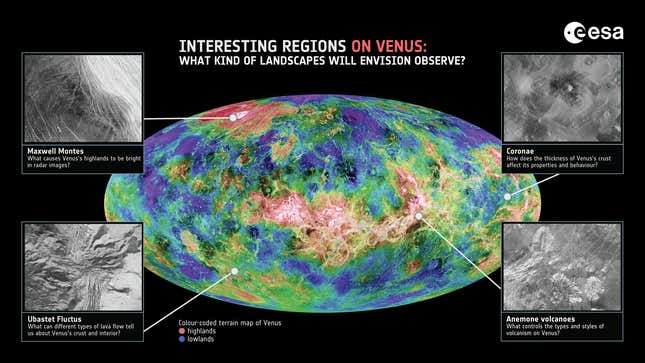The EnVision mission to Venus was officially adopted by the European Space Agency on Thursday, which means the organization has committed to getting the spacecraft Venus-bound by the early 2030s.
EnVision is a planned Venus orbiter designed to study the planet from its upper atmosphere to its core. Venus is in many ways a black (or mustard-colored) box for planetary evolution; thought to have formed in similar circumstances to Earth, the world is now hot, seasonless, and shrouded in clouds of sulfuric acid. It also rotates backward, has air pressure 92 times what we experience on Earth, and may still have active volcanism on its surface. Basically, there are a lot of big questions as to how Venus ended up so different to our balmy, life-covered marble.
“Special to EnVision is the mission’s approach to studying the entire planet as a system,” said Anne Grete Straume-Lidner, EnVision’s project scientist, in an ESA release. “It will investigate Venus’s surface, interior and atmosphere with unprecedented accuracy, allowing us to understand how they work and interact with each other. For example, EnVision will use multiple measurement techniques to search for signatures of active volcanism at the surface and in the atmosphere.”
EnVision was announced in 2021, within days of NASA announcing its own intentions to head to our hellish neighbor. The flurry of missions follow up on a prolonged lull in Venusian investigation. NASA’s last visit to Venus was the Magellan mission, which ended in 1994.

ESA has been there more recently: Its Venus Express orbiter arrived in the planet’s vicinity in 2006 and finished its work by 2014, while the Japanese space agency, JAXA, put a spacecraft in the planet’s orbit in 2015. But even that mission—the most recent to Venus—launched back in 2010. It will have been a quarter-century since ESA’s last launch to Venus, should EnVision make its slated launch date of 2031. The orbiter is expected to depart for the planet on an Ariane 6 rocket.
NASA’s announced its plans for two Venus missions—VERITAS and DAVINCI+—in June 2021. But budget issues at the agency’s Jet Propulsion Laboratory led to the delay of VERITAS the following year, and in 2023, all but a fraction of the mission’s funding was pulled.
While ESA is not fretting about costs like NASA, a lot can change in seven years. The green light on EnVision does not assure the mission’s launch—what Yogi Berra famously said about ball games generally applies to interplanetary missions, too. But now, with ESA’s blessing, EnVision is one step closer to deciphering Venus’ many mysteries.
More: Why Venus Is Soon to Be the Most Exciting Place in the Solar System

